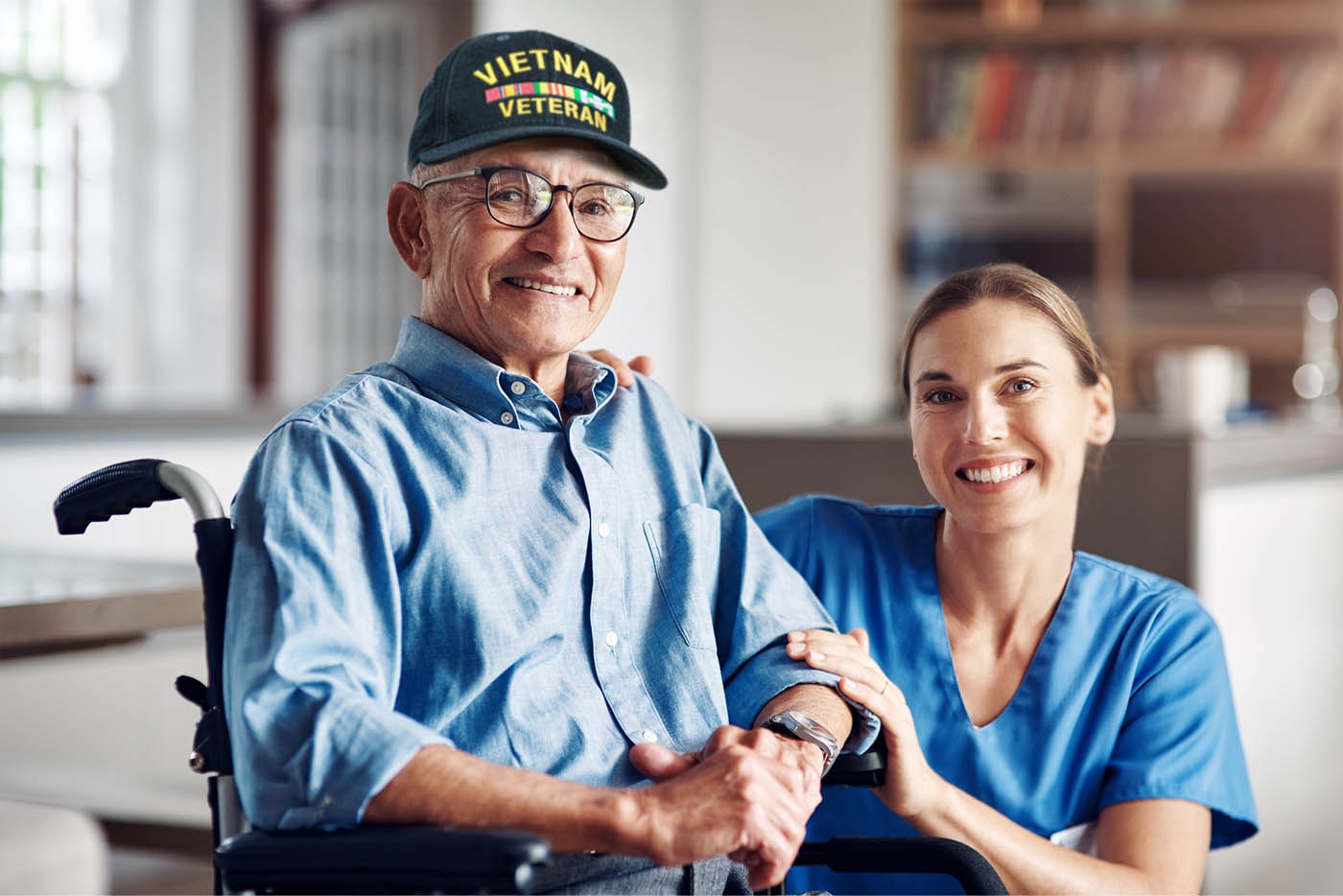
Meeting Veterans Special Needs at the End of Life
The U.S. Armed Forces train service members to be mission-focused, stoic, and courageous. Whether deployed at home or overseas, military personnel face intense stress—from combat and separation from family to physical strain and isolation. After transitioning to civilian life, these experiences may surface in unexpected ways. When a veteran is diagnosed with a terminal illness, the emotional and psychological impact of their past service can become even more pronounced.
That’s why veterans deserve end-of-life care from a team that understands how to support, uplift, and respond to their unique—often unspoken—needs and those of their families. Sadly, the same strength that served them so well during active duty can make it difficult for veterans to ask for help. For this reason, hospitals and private physicians often refer terminally ill veterans to hospice programs with experience caring for those who have served.
Hospice Explained
Hospice is a type of care—not a place. It focuses on improving quality of life rather than continuing treatments that may be painful and unlikely to extend life expectancy. Hospice care can begin when a physician determines that medical interventions will no longer alter the outcome and the patient’s prognosis is six months or less. Care is provided by an interdisciplinary team (IDT), which often includes the patient’s doctor, a hospice physician or medical director, nurses, hospice aides, social workers, bereavement counselors, spiritual advisors, trained volunteers, and other clinical or supportive care specialists as needed. Learn more about hospice.
Trauma Informed Care
Many military veterans—especially those who’ve served in combat zones—live with post-traumatic stress disorder (PTSD). Some have also been exposed to chemical warfare, sustained traumatic brain injuries, or face a higher risk of substance use. For these individuals, certain triggers—such as loud noises, sudden movements, physical restraints, perceived disrespect, or specific medications—can resurface emotional wounds, cause panic or anxiety, and even lead to physical pain or destructive behaviors. A terminal illness diagnosis can also retraumatize not only the veteran but their loved ones as well.
To address these complex needs, 4,120 hospice providers nationwide participate in the We Honor Veterans initiative—a program created by the U.S. Department of Veterans Affairs and the National Hospice and Palliative Care Organization. This initiative is designed to ensure that veterans receive thoughtful, trauma-informed care that includes compassionate listening and recognition of their service.
MJHS, based in New York, is one of only 11 hospices nationwide to achieve Level 5—the highest partner status in the We Honor Veterans program. As part of this distinction, MJHS also serves as a regional mentor to other hospice organizations.
All veterans under the care of a Level 5 We Honor Veterans program are assessed for trauma. Those who need or are already receiving counseling but are too medically fragile to visit a VA facility are referred to PTSD-specialist counselors who provide support in the comfort of the veteran’s home.
Other elements of the We Honor Veterans program include, but are not limited to:
- Accessing resources based on available military benefits
- Adjusting medication management to ensure those with a history of drug dependency don’t relapse or live in pain
- Incorporating nonpharmacologic and alternative therapies—including music and art therapy
- Fostering reconciliations and feelings of control
- Veteran-to-veteran volunteer visits
- Assistance with military burials
- Emotional and spiritual support services for families, including younger children who may still be in the home
Family Unit
When military members serve our country, their families serve right along with them. Years after active service, military families often play active roles as advocates and caregivers. While this is an act of love, it can be very stressful, especially if past traumas trigger agitation and outbursts from their loved one at the end of life. In these situations, members of the hospice team help the primary caregiver—and the whole family—come to peace with important decisions and provide emotional support.
In some cases, the hospice team also helps families celebrate the service of their loved one through a recognition, flag pinning, and certificate of appreciation presentation ceremony. Support continues up to 13 months after the death of a loved one.
Always in Service
Just like when veterans were once in uniform, the hospice team is on call 24 hours a day, seven days a week. The goal is never to leave anyone behind or completely alone.
Each hospice patient is regularly visited, and the care plan is adjusted as needed. The team:
- Provides basic medical care with a focus on pain and symptom control
- Supports the patient and their families with the emotional, psychosocial, and spiritual aspects of dying
- Provides medications and medical equipment
- Teaches families how to help care for their loved ones and themselves
- Offers music and art therapies for families to help address or shift focus from emotional or physical pain
- Makes short-term inpatient care available when pain or symptoms become too difficult to manage at home or the caregiver needs respite time
- Provides grief support and counseling to surviving family and friends
There are many ways to thank the military for serving this country. Providing compassionate, respectful, and mindful care to veterans at the end of life is a duty and one of the highest honors that any hospice program can have.
At MJHS, we value both personal and professional caregivers and recognize the critical work you do. That is why we have created these online caregiving resources to help you through this crucial time in your life.
If you need additional help and support caring for your loved one, please feel free to contact MJHS. We can recommend other care options available to you through one of our programs.